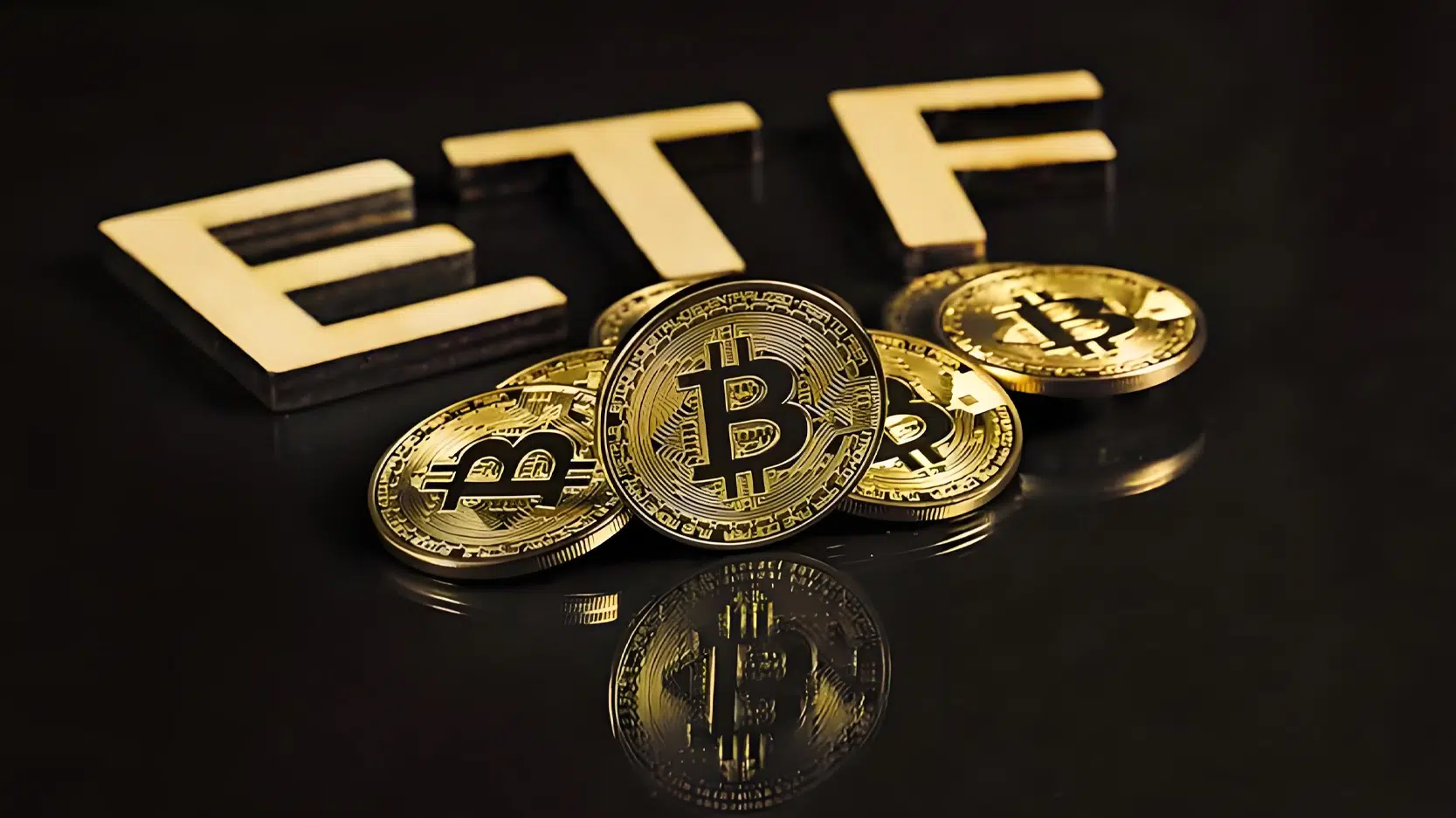Bitcoin Spot ETF Investment Guide: 5 US Crypto ETF Recommendations & How to Buy in Taiwan

What is a Bitcoin Spot ETF? Why is it so important?
Are you also excited about the potential of Bitcoin, but daunted by its complex storage methods and the security of exchanges? Imagine if investing in Bitcoin could be as simple and secure as buying and selling stocks. How great would that be?
This is the purpose behind the creation of the Spot Bitcoin ETF. On January 10, 2024, the U.S. Securities and Exchange Commission (SEC) historically approved the first batch of Spot Bitcoin ETFs. This is not only a milestone for the cryptocurrency market but also opens a brand new door to Bitcoin investment for global investors, especially our friends in Taiwan and Malaysia.
Quick Guide: Spot Bitcoin ETF vs. Futures ETF vs. Direct Holding
Let’s use a simple analogy to understand:
- Directly Holding Bitcoin: This is like you personally buying a real piece of gold. You need to find a place to store it (cold wallet, hot wallet), worry about it being stolen (hacker attacks), and handle the transactions yourself. The process is relatively complex, and you bear the risks yourself.
- Bitcoin Futures ETF: This is like buying a contract on the “future price of gold.” You are betting on the rise or fall of the future gold price, but you don’t hold any actual gold. It tracks futures prices and may have issues like “roll costs” and “tracking errors.”
- Bitcoin Spot ETF: This is like buying a “gold holding certificate.” The company that issues this certificate (like BlackRock) will buy and hold “physical gold” (i.e., real Bitcoin) in the market, while you just need to buy and sell this certificate on the stock market. Its price directly reflects the market price of real Bitcoin, making it simple, intuitive, and transparent.
Core Difference: A Spot Bitcoin ETF is genuinely backed by physical Bitcoin. Each share of the ETF corresponds to real, custodied Bitcoin held in a vault.
The 3 Major Advantages of Investing in Bitcoin Spot ETFs
Why is the global capital market so excited about Bitcoin Spot ETFs? Because it solves three major pain points for retail investors:
- Low Barrier to Entry & High Convenience: No more need to research complex wallets, private keys, or register accounts on cryptocurrency exchanges. All you need is a U.S. stock brokerage account, and you can easily invest in Bitcoin with just a few clicks, just like buying any other stock.
- High Liquidity & Security: These ETFs are listed on major exchanges like the New York Stock Exchange (NYSE) and NASDAQ, with huge trading volumes, making buying and selling very convenient. More importantly, the issuers are financial giants like BlackRock and Fidelity, which are strictly regulated, so your assets are protected by the traditional financial system.
- Compliance & Regulation: Approval by the SEC means that Bitcoin, as an asset class, has received official endorsement for its legitimacy and transparency. This is undoubtedly a reassurance for institutional and conservative investors.
Potential Risk Assessment
Of course, all investments come with risks, and Bitcoin Spot ETFs are no exception:
- Price Volatility Risk: The ETF’s price is linked to the spot price of Bitcoin, and Bitcoin itself is a highly volatile asset. Its price can experience sharp fluctuations in a short period.
- Management Fees: Like all ETFs, the issuer charges an annual management fee (Expense Ratio), which will eat into a portion of your investment returns.
- Tracking Error: Although spot ETFs aim to closely track the price of Bitcoin, there may be slight deviations between the ETF’s Net Asset Value (NAV) and the market price of Bitcoin due to management, trading, and other factors.
Top 5 Bitcoin ETFs to Watch in 2025! US Stock Recommendations
With a dazzling array of Bitcoin Spot ETFs on the market, how do you choose? Here, we have selected 5 of the most representative and closely watched products on the market for an in-depth comparison.
Market Leader: BlackRock iShares Bitcoin Trust (IBIT)
Issued by BlackRock, the world’s largest asset management company, the BlackRock Bitcoin ETF ticker is IBIT. With its strong brand reputation, substantial financial backing, and highly competitive initial fees, IBIT has rapidly attracted a massive inflow of funds since its launch, becoming the most iconic Bitcoin Spot ETF on the market. For investors who prioritize stability and trust in major brands, IBIT is undoubtedly the top choice.
Strong Competitor: Fidelity Wise Origin Bitcoin Fund (FBTC)
Fidelity is another asset management giant, and its FBTC fund closely follows IBIT in terms of scale and liquidity. Fidelity has been involved in the cryptocurrency space for a long time, with its own digital asset custody and research teams, and its expertise is highly recognized. The healthy competition between FBTC and IBIT has also resulted in lower fees and better products for investors.
King of Scale: Grayscale Bitcoin Trust (GBTC)
Grayscale’s GBTC is a veteran in the market, having converted from a trust fund to a spot ETF. Its biggest advantage is its enormous assets under management (AUM), which translates to excellent liquidity. However, GBTC’s management fee is relatively high, a key factor for investors to consider. It will be interesting to see if Grayscale will lower its fees in the future to compete.
Other Popular Choices: ARK 21Shares (ARKB) & Bitwise (BITB)
- ARKB: Launched as a collaboration between Cathie Wood’s ARK Invest and 21Shares, this ETF has a celebrity appeal that has attracted many tech stock investors.
- BITB: Bitwise is a company specializing in crypto index funds. Its professional image and relatively low fees have also earned it a place in the market.
Comparison Table: Overview of Management Fees, Scale, and Issuers for 5 Mainstream Bitcoin ETFs
To give you a clearer comparison, we have compiled the following table (Note: Fees and scale are dynamic data, please refer to the latest official information):
| ETF Ticker | Issuer | Expense Ratio | Features |
|---|---|---|---|
| IBIT | BlackRock | ~0.25% (Often with initial waivers) | Issued by the world’s largest asset manager, high brand trust, strong capital inflow. |
| FBTC | Fidelity | ~0.25% | Asset management giant with deep involvement in digital assets, high level of expertise. |
| GBTC | Grayscale | ~1.50% | Largest scale, best liquidity, but higher fees. |
| ARKB | ARK / 21Shares | ~0.21% | Backed by Cathie Wood’s star power, favored by tech investors. |
| BITB | Bitwise | ~0.20% | Crypto index fund specialist, competitive fees. |
💡 Recommended Article
Want to learn more about ETFs (Exchange-Traded Funds)? We recommend reading:
A Must-Read for Taiwanese Investors: How to Buy Bitcoin Spot ETFs?
If you’re in Taiwan or Malaysia and want to invest in these U.S.-listed Bitcoin ETFs, there are mainly two channels. Here’s a detailed analysis of their pros and cons.
Method 1: Direct Purchase Through Overseas U.S. Stock Brokers (Recommended)
This is the most direct and cost-effective method. By opening an account with a well-known overseas broker (e.g., Firstrade, TD Ameritrade, Interactive Brokers), you can trade these ETFs directly on the U.S. market.
- Pros: Extremely low (or even zero) transaction fees, diverse trading options, and fast order execution.
- Cons: You need to handle the account opening and wire transfer process yourself, and there are bank fees when repatriating funds.
Brief Steps:
- Choose a reputable overseas broker that supports international clients.
- Prepare your identification documents (passport, ID card) and proof of address, and fill out the online application.
- After your account is approved, wire funds from your bank in Taiwan to your brokerage account.
- Once the funds arrive, log in to the trading platform, enter the ETF ticker (e.g., IBIT), and place your buy order.
Method 2: Using a Taiwanese Broker’s Sub-Brokerage Service
“Sub-brokerage” means you place an order through a domestic broker, who then delegates the trade to an overseas partner broker. In simple terms, it’s your “investment purchasing agent.”
- Pros: Funds do not need to be sent abroad, and you can use your familiar Taiwanese stockbroker’s app to place orders, which is convenient.
- Cons: Fees are typically much higher than with overseas brokers, and there may be minimum commission charges, which can erode profits over the long term.
Current Taiwanese Regulations: The Financial Supervisory Commission’s (FSC) Stance and Investor Notes
Currently, the stance of Taiwan’s FSC is to “prohibit” domestic securities investment trust companies from issuing or introducing Bitcoin Spot ETFs. It also “does not permit” brokers to proactively recommend these products to clients through sub-brokerage. However, this does not mean that investors cannot invest through overseas brokers on their own.
In simple terms, the regulator’s attitude is: We don’t encourage it, but if you have your own means and channels to invest overseas, it is not currently prohibited. Investors must bear the relevant risks themselves and understand the tax regulations for overseas investments.
Beyond Going Long! Getting to Know Special Crypto ETFs
In addition to spot ETFs that directly track the price of Bitcoin, there are other crypto ETFs with different strategies on the market, making investment portfolios more flexible.
Profit from Bearish Views: What is an Inverse Bitcoin ETF?
When you expect the price of Bitcoin to fall, an Inverse Bitcoin ETF is the tool for you. For example, the ProShares Short Bitcoin Strategy ETF (ticker: BITI) aims to provide the “inverse” of the daily return of a Bitcoin futures index. This means if Bitcoin futures fall by 1%, the net asset value of BITI should theoretically rise by 1% (before fees and compounding effects).
Note: Inverse ETFs are high-risk, short-term trading instruments and are not suitable for long-term holding due to their daily reset feature.
Future Trends: The Possibility of Ethereum or Other Crypto ETFs
After Bitcoin, the market’s next focus is undoubtedly the “Ethereum Spot ETF.” With the development of blockchain technology, we may also see the emergence of crypto ETFs that track a basket of cryptocurrencies or specific sectors (like DeFi, GameFi), providing investors with more diverse options.
Conclusion
The advent of the Bitcoin Spot ETF is undoubtedly a key step for cryptocurrency moving into the mainstream financial market. It provides ordinary investors like you and me with a safer, more convenient, and more compliant channel to participate in the value growth of Bitcoin. This article has broken down the core concepts of Bitcoin Spot ETFs and provided a detailed comparison of the 5 mainstream ETFs, led by BlackRock’s IBIT, which should help you make a more informed decision.
For investors in Taiwan and Malaysia, using an overseas U.S. stock broker is currently the most cost-effective investment method. Before taking your first step in investing, be sure to carefully assess your own risk tolerance and conduct thorough research. The cryptocurrency market is full of opportunities but also accompanied by volatility. Being prepared is the only way to navigate this digital wave steadily. Happy investing!
FAQ (Frequently Asked Questions)
❓What is the ticker symbol for the BlackRock Bitcoin ETF?
The Bitcoin Spot ETF issued by BlackRock is listed on the NASDAQ exchange under the ticker symbol IBIT.
❓Do I need to pay taxes on Bitcoin ETF trading in Taiwan?
Yes. For investments in U.S. stock ETFs through an overseas broker, the capital gains are considered overseas income. According to Taiwanese tax law, if your total annual overseas income exceeds NT$1 million, you must declare it. If your total basic income (including this overseas income) exceeds NT$6.7 million (this threshold may change), you will be subject to the alternative minimum tax. Dividends are subject to a 30% withholding tax. It is recommended to consult a professional accountant for the most accurate information.
❓By investing in a Bitcoin ETF, do I actually own Bitcoin?
Not directly. You own “shares” of the ETF, and the ETF issuer (like BlackRock) acts on behalf of all shareholders to purchase and hold an equivalent value of Bitcoin as reserves. You can think of it as owning a “Bitcoin claim ticket.” You benefit from its value fluctuations, but you cannot directly transfer the Bitcoin to your own wallet. The advantage of this model is security and convenience; the disadvantage is the loss of direct control over the Bitcoin.
❓What are the typical management fees for Bitcoin Spot ETFs?
The competition over management fees for Bitcoin Spot ETFs is very fierce. Currently, the annual fees for mainstream products range from about 0.20% to 0.30%. However, many issuers offered fee waivers or reductions at launch, such as waiving management fees for the first six months or for the first few billion dollars in assets. Older products like GBTC may have fees as high as 1.5%. Be sure to compare the latest official fee information when choosing.
Related Articles
-
As the announcement of the 2025 Budget on February 26, 2025, approaches, Hong Kong society is closely watching how the government will balance the need for relief measures with structural reforms amidst the pressure of its HK$680 billion fiscal reserves. Financial Secretary Paul Chan Mo-po's recent emphasis on "precision in...2025 年 10 月 11 日
-
The Hong Kong Securities and Futures Commission (SFC) officially granted operating licenses to two cryptocurrency trading platforms—PantherTrade and YAX—on January 27, 2025, further promoting the compliant development of Hong Kong's crypto market. Since launching its licensing program in mid-2024, the SFC has issued licenses to seven Virtual Asset Trading Platforms...2025 年 10 月 11 日
-
As the U.S. Consumer Price Index (CPI) for January exceeded expectations, market forecasts for the Federal Reserve's future monetary policy shifted, causing the U.S. Dollar Index to rise rapidly and leading to a pullback in gold prices. However, despite this pressure, the gold market still shows potential for growth, primarily...2025 年 10 月 11 日












